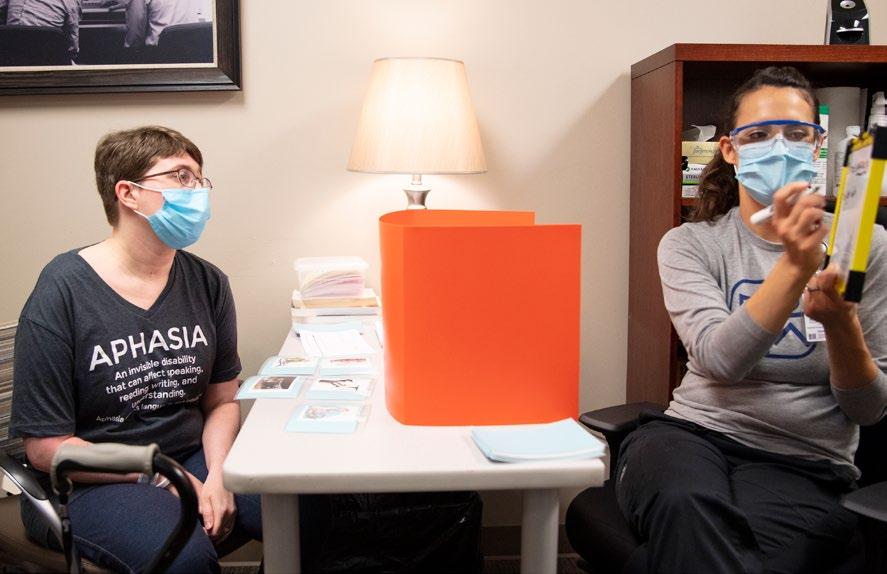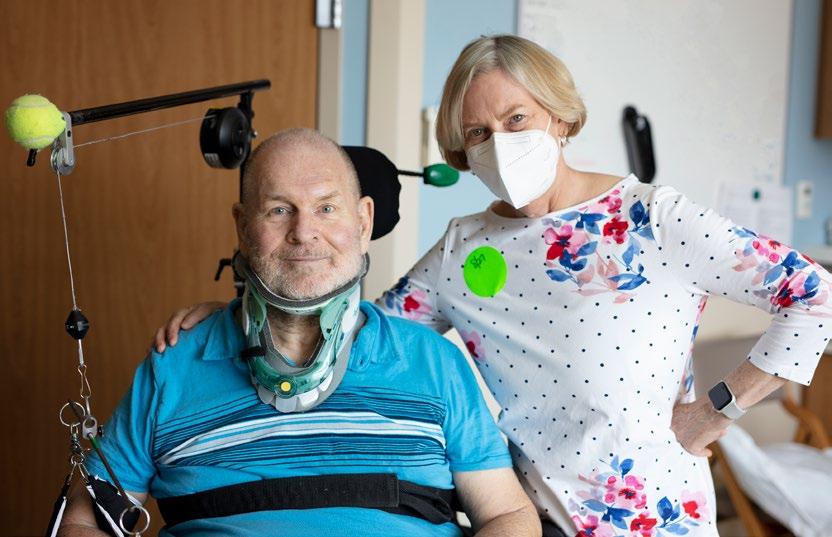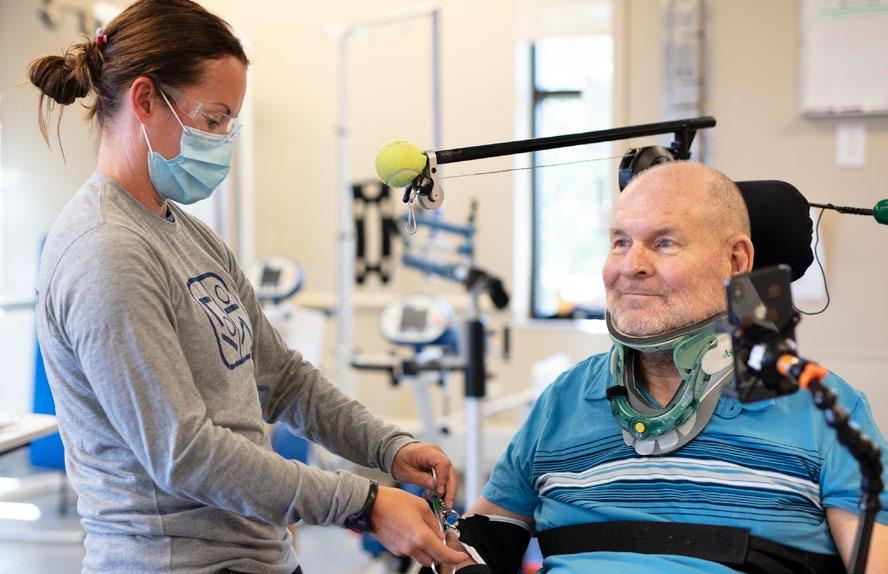
5 minute read
Meet Our Patients
MEET DANIELLE

Just five days after Danielle Plomaritas had her third child, she fell into a coma for nearly a month due to a stroke. Danielle was a 32-year-old high school biology teacher in Rio Rancho, New Mexico, and was pursuing her Ph.D. in education at Texas Tech when she had her stroke. She and her husband were excited to welcome their third little boy into the world in October 2018, but a combination of high blood pressure and giving birth resulted in the stroke several days after her son was born. The very night of the stroke, Danielle underwent major surgery to remove a portion of her skull, called a bone flap, because of how much her brain had swelled. “I went to Craig with only half a skull,” Danielle explains. “The rest was in me next to my pelvis.” The bone flap that had been removed was stored in her abdomen until she was ready for the surgery to put it back. Two months after arriving at Craig Hospital for her brain injury rehabilitation, Danielle had the second surgery to replace the removed portion of her skull. When Danielle left Craig, she was using a wheelchair to help her get around, and just three months later, she was practicing walking by using a leg brace. As she continued to make progress with mobility and communication, Danielle decided in early 2020 that she wanted to participate in an aphasia program to improve her comprehension and speaking skills. “I can’t go to school,” Danielle says. “I understand fine, but my response back will be difficult.” She was considering a number of aphasia programs across the U.S. when the COVID-19 pandemic hit, and when she learned that the Craig Hospital Aphasia Therapy (CHAT) Program was going virtual, she knew that was what she wanted to do. “It’s like being with a friend,” Danielle says about working with Kristen Mascareñas Wendling, MA, CCCSLP, Craig’s Aphasia Program coordinator. “I had her, inpatient, almost 1.5 years [ago].” With the flexibility of participating in the program from her parents’ home in New Mexico via Zoom and being able to have two days of in-person sessions in August, Danielle says that her experience with the CHAT Program was “just wonderful,” with much progress through intensive therapy to show for it. “Danielle is an incredible advocate for herself,” Kristen shares. “She directly asked for what she needed. This was so great to see with someone who has aphasia and may have difficulty communicating his/her needs directly.” Danielle is looking forward to getting out and about again once the pandemic is over, including volunteering at her local library’s discount bookshop and returning to her regular occupational, speech and physical therapy sessions. Danielle is a lifelong learner and plans to keep on challenging herself to grow as a mother, wife, community member and stroke survivor.

MEET TOM & MAGGIE


Only a couple of miles from Craig’s campus, Tom Colbert was bicycling with his grandchildren in May 2020 when he lost his balance and swerved into a parked car. When he lost all feeling in his arms and legs, he immediately knew he had sustained a serious injury. His son-in-law, a former EMT, helped stabilize him until an ambulance came to take him to a local hospital for emergency surgery. In June, he came to Craig for the neurorehabilitation of his spinal cord injury. “It was a huge relief to finally get to Craig Hospital,” Tom says. “I knew that if any place was going to give me hope for the future, Craig would.” By the time Tom and his wife, Maggie, came to Craig, COVID-19 restrictions had been in place for several months. Their Craig experience was different from the experiences of patients in years past, but Tom and Maggie were grateful to receive the specialized therapy Craig staff provide in addition to the level of protection from COVID-19 needed by Tom - a person at higher risk for COVID-19 complications, as many other people with tetraplegia are - during the pandemic that was in full swing over the summer and early fall. Tom and Maggie diligently followed COVID-19 prevention protocols (Tom was exempted from Craig’s masking policy since he could not safely put on and remove his own mask) and often attended the weekly Craig patient/caregiver Zoom calls with Craig staff to receive updates on policy changes and share ideas and feedback on things like making extended family and friend visitations safely possible, ways to adapt or replace off-campus therapy and learning experiences that had to be postponed due to COVID-19 restrictions, and making vital connections with other patients and caregivers virtually. Before Tom was discharged from Craig, Maggie worked closely with staff using videos of their house to prepare and modify it for Tom’s return home. Tom and Maggie also went through extensive on-site education by Craig staff to prepare the couple for Tom’s daily self-care and to help them learn to educate others, since they planned to hire caregivers to assist them. They continued to do outpatient therapy at Craig and worked hard to transition well and settle into a routine at home. They have enjoyed spending time in their new modified home with their children and grandchildren while continuing to practice COVID-19 precautions; Tom was even recently vaccinated against COVID-19. The highlight of Tom’s time since leaving Craig: “Giving my grandkids rides on my wheelchair.” “We’re living a new life together, constrained by mobility but still full of rich and rewarding activities with our family and friends,” Tom says.
It is with great sadness that we share that Tom passed away suddenly and unexpectedly in March 2021. This story was published in loving memory of Tom with gratitude to his amazing, supportive family.










